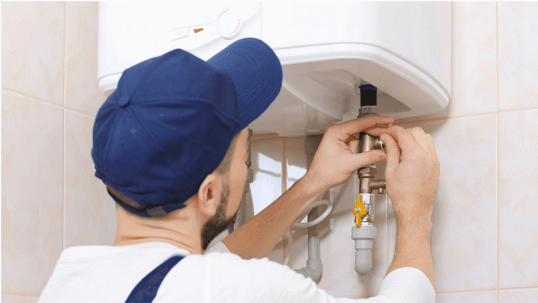Dealing With Standard Heater Problems
Dealing With Standard Heater Problems
Blog Article
We've found this great article relating to Water Heater Repair and Troubleshooting directly below on the net and decided it made perfect sense to talk about it with you here.

Envision starting your day without your regular warm shower. That currently sets a bad tone for the remainder of your day.
Every home needs a reputable water heater, however just a couple of know how to handle one. One simple means to maintain your hot water heater in leading shape is to check for faults frequently and fix them as soon as they appear.
Remember to turn off your water heater prior to sniffing about for mistakes. These are the water heater mistakes you are probably to encounter.
Water also warm or as well chilly
Every water heater has a thermostat that determines just how warm the water gets. If the water coming into your house is also warm despite establishing a hassle-free maximum temperature, your thermostat could be defective.
On the other hand, too cold water might result from a stopped working thermostat, a broken circuit, or inappropriate gas flow. As an example, if you utilize a gas hot water heater with a damaged pilot burner, you would obtain cold water, even if the thermostat is in best condition. For electrical heating units, a blown fuse might be the culprit.
Not nearly enough hot water
Water heaters can be found in many sizes, relying on your warm water demands. If you run out of hot water before every person has actually had a bath, your water heater is as well little for your family size. You need to consider installing a larger water heater storage tank or selecting a tankless water heater, which uses up less area as well as is a lot more long lasting.
Odd sounds
There are at least five kinds of noises you can hear from a water heater, but the most usual analysis is that it's time for the hot water heater to retire.
Firstly, you ought to be familiar with the normal appears a hot water heater makes. An electric heater might sound various from a gas-powered one.
Standing out or banging sounds generally indicate there is a slab of debris in your storage tanks, and it's time to cleanse it out. On the other hand, whistling or hissing sounds might simply be your valves letting some pressure off.
Water leakages
Leakages could originate from pipes, water links, valves, or in the worst-case situation, the tank itself. Gradually, water will corrode the container, and discover its escape. If this happens, you need to change your water heater immediately.
Nonetheless, prior to your change your entire storage tank, make certain that all pipes remain in area which each valve works completely. If you still require aid recognizing a leakage, call your plumber.
Rust-colored water
Rust-colored water means one of your water heater elements is worn away. It could be the anode rod, or the tank itself. Your plumber will be able to identify which it is.
Warm water
Despite just how high you established the thermostat, you will not obtain any type of hot water out of a heater well past its prime. A water heater's performance might minimize with time.
You will also obtain warm water if your pipes have a cross connection. This suggests that when you activate a tap, hot water from the heating system flows in along with routine, cold water. A cross connection is very easy to area. If your warm water taps still run after closing the water heater shutoffs, you have a cross connection.
Discoloured Water
Corrosion is a major root cause of dirty or discoloured water. Rust within the water tank or a falling short anode rod might cause this discolouration. The anode pole safeguards the container from rusting on the inside as well as should be inspected annual. Without a pole or an appropriately operating anode rod, the hot water rapidly rusts inside the container. Contact a professional hot water heater professional to determine if replacing the anode pole will fix the trouble; otherwise, replace your hot water heater.
Final thought
Preferably, your hot water heater can last 10 years before you need a change. Nevertheless, after the 10-year mark, you may experience any of these faults more routinely. At this point, you should add a brand-new hot water heater to your budget plan.
How To Troubleshoot 3 Common Water Heater Problems in Twin Cities
The Water Heater Is Leaking
A leaky cold water inlet valve A loose pipe fitting A leaky temperature and pressure relief valve A corroded anode rod A cracked tank Turn Off Your Water Heater:
Shut off your gas water heater by turning the gas valve on the unit to the “OFF” position. Shut off your electric water by switching its power off at your electrical panel. Look for a two-pole breaker labeled “water heater” and turn it to the “OFF” position. Move the ball valve connected to the water heater to be perpendicular to the piping at a 90° angle. Look for the Leak:
Depending on whether the water is coming from the tank's top or bottom, you’ll want to look for the leak in different locations.
If the leak comes from the top of the tank, carefully look for water escaping from the cold water inlet valve or loose pipe fittings. Rusted hot and cold water valves can have loose connections with the tank, with water leaking out of them.
https://mspplumbingheatingair.com/blog/how-to-troubleshoot-3-common-water-heater-problems
Do you really like reading about Water Heater Repair and Troubleshooting? Post a remark down below. We would be delighted to hear your thoughts about this posting. We are looking forward that you visit us again before long. Do you know about another individual who is curious about Water Heater Repair and Troubleshooting? Take a moment to promote it. Thank you for taking the time to read it.
Quick fix? We're here. Report this page